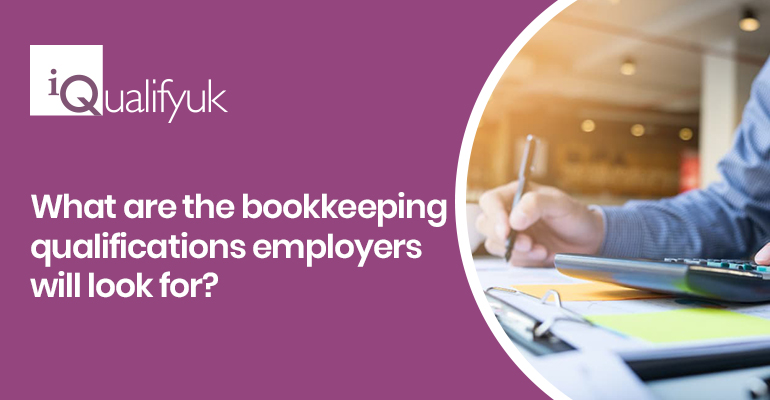What are the bookkeeping qualifications employers will look for?
September 7, 2023 2023-09-07 12:59What are the bookkeeping qualifications employers will look for?

What are the bookkeeping qualifications employers will look for?
The bookkeeping qualifications employers will look for depend on the level at which you intend to work. The various levels within the structure of the accounts function can be classified as:
Level 1 – general clerical level
Job titles include: Payroll clerks, cashiers, petty cashier, purchase ledger clerks, sales ledger clerks, stores clerks, credit control clerks
The term ‘clerk’ is widely used as an alternative to ‘bookkeeper’ at this level. This is the first rung of the career ladder. People employed at this level will be expected to have basic qualifications such as the IAB Level 1 or Level 2 computerised bookkeeping qualifications. They will be gaining the experience that will hopefully allow them to specialise and progress to supervisory status.
The clerks operating at general clerical level will carry out basic bookkeeping duties and are likely to have very limited responsibility. Their duties are likely to be associated with routine clerical tasks. Job roles at this level are likely to be interchangeable.
Level 2 – lower technical level
Job titles include: payroll supervisor, chief cashier, purchase ledger supervisor, sales ledger supervisor, stores supervisor, credit controller
The term ‘clerk’ is still likely to be used to describe the work of the bookkeeper operating at this level. However, here the individual will be acting in a supervisory role and must, therefore, have the necessary experience, qualifications and supervisory skills.
People working at lower technical level, or wanting to work at this level, will have had several years’ experience of the work carried out at general clerical level within one or more of the sections within the organisation. They would be expected to hold at least a Level 2 bookkeeping qualification and hold, or be working towards, a Level 3 qualification.
Lower technical duties are likely to include supervising the work of those working at the general clerical level. The work is also likely to involve the monitoring and checking of work carried out by those engaged in lower level activities.
People operating at lower technical level will be expected to be specialists in the work of the section they supervise, and job roles at this level are likely to be less interchangeable.
Level 3 – higher technical level
Job titles include: main ledger supervisor, assistant financial accountant
To function effectively at this level the individual would require a great deal of experience in the work at general clerical level and lower technical level.
In addition to a wealth of experience individuals working at this level will almost certainly need the IAB Level 3 qualification and probably also hold, or be working towards, a Level 4 qualification.
At this level of work the job role is likely to be that of ‘assistant accountant’ or in private practice ‘senior clerk’. The work carried out at higher technical level is likely to be accounting based rather than bookkeeping based.
Duties and responsibilities at this level are likely to include activities such as preparing the Trial Balance and making the accounting adjustments that are necessary when preparing financial statements. Those working at higher technical level are usually in a support role to their chartered colleagues.
Statistics show that many of those who have achieved higher technical level status will go on to achieve chartered status.
Level 4 – chartered level
Job titles include: financial accountant
To achieve chartered level would be the pinnacle of a career in accounting for most people.
Chartered status requires you to pass a number of practical and written examinations at several levels set by a professional accounting body. There is also a requirement that you have gained several years of relevant work experience.
Those who study for a chartered qualification in financial accounting often choose the Association of Certified and Chartered Accountants (ACCA) route, whilst those who want to study for a chartered management accounting qualification will normally opt for the Chartered Institute of Management Accounting (CIMA) qualification.
Chartered status elevates an individual to senior management level within the organisation’s accounting function. Those who operate at this level therefore need management skills in addition to their technical accounting skills. Chartered accountants are likely to be involved in a wide range of highly technical accounting activities including the preparation of financial statements in accordance with regulatory requirements, taxation, auditing, corporate finance and insolvency. They would be expected to have a solid foundation in business, marketing, finance, management and information systems.
This is an extract from the International Association of Bookkeepers (IAB) Level 1 Award Study Text (which is provided free to all iQualify UK students studying for a Level 1 IAB qualification, with equivalent Study Texts at other levels).
By an iQualify UK staff writer.
Recent Posts
- iQualify UK is excited to announce our recent accreditation with Pearson
- iQualify UK honoured with Queen’s Award for Enterprise: International Trade
- How is Leadership Related to Management in a Contemporary Business Environment?
- How Do Barriers to Change Influence Leadership Decision-Making?
- How Does Change Impact on an Organisation’s Strategy and Operations?



















